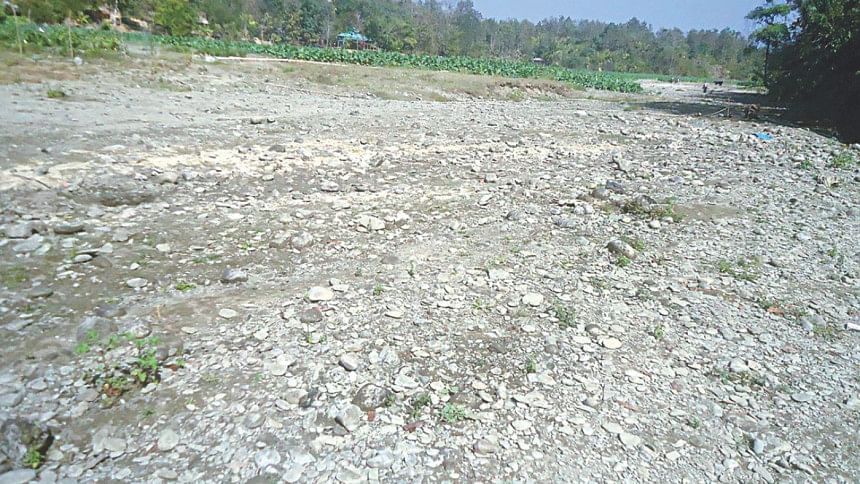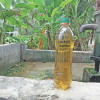Destruction of forests, stone theft send hill creek to death throe

Unabated destruction of forests coupled with stone theft and use of deep tubewells at tobacco plantations have dried up the once mighty Roambo jhiri (a creek or small stream) in remote hills of Bandarban's Alikadam upazila.
As a result, indegenous communities living in and around Jogendra Tangchangya Para of the upazila are suffering from acute fresh water crisis for several years.
At least 35 members of eight such indigenous Tongchangya families, dependent on the water from the creek, have already left the area last year, while a handful others, still holding on to their ancestral homes, are considering to leave too.
“As water became scarce in our neighbourhood, the eight families left last year,” said Aung Kya Ching, Karbari (village chief) of Jogendra Tangchangya Para.

The remaining residents of the Para said the drying up of the Roambo jhiri has made their life difficult and unless a solution is found soon, the situation might force them to leave the area for the sake of their survival.
During a recent visit to the area, this correspondent found indigenous families living in surrounding areas -- including Bashudeb Chakma Karbari Para, Chaiya Para and Ruhimon Para of the upazila -- are also facing a severe scarcity of water.
Locals said countless springs and creeks, their primary sources of fresh water, have dried up in remote areas of Bandarban within a span of only five to six years.
“After Roambo jhiri, the lifeline to our Para, dried up, we dug a few wells. But the wells don't have much water either,” said Ruima Yoi Tongchangya, a woman living in Jogendra Para.
An elderly woman of the area, Sadumay Tongchangya, said, “Water flow at the jhiri was abundant only around 15 years back.”
“The once mighty Roambo jhiri has now turned barren as unscrupulous outsiders extracted almost all the stones from the bed of the stream,” she lamented.
Indiscriminate environmental destruction in the hills is one of the main reasons behind the loss of waterflow in the streams, said Jogendra Para village chief Aung Kya Ching, adding, “The woods up in the hills, from where water seeps into the creeks, have depleted, while the stones that retain the water in the streams have been taken out.”
He also said they went to the office of local administration several times with complaints, but the administration did not take any action to stop the illegal logging, stone extraction or the use of deep tubewells at tobacco plantations in the area.
In order to find an explanation to the water scarcity in the hills of Bandarban, this correspondent aproached Dr Md Atiqur Rahman, an associate professor of Geography and Environmental Studies department at Chittagong University, on Monday.
Echoing village chief Aung Kya Ching's observation, Dr Atiqur said deforestation, stone extraction and use of deep tubewells for irrigation at tobacco plantations are causing the severe water scarcity in the hills.
“Rampant deforestation in the Chitaggong Hill Tracts are causing heavy damage to sources of water,” he said.
Stones on beds of the creeks or waterbodies in hilly areas definitely work as a layer that helps waterbodies retain water, Dr Atiqur said, adding that water slowly seeps through and dries out a waterbody when the stones are removed from the bed of a waterbody.
When asked how tobacco plantations are affecting the waterbodies in the hills, he said tobacco leaves evaporate water profusely and therefore a tobacco plantation consumes a huge amount of water.
So, when underground water is pumped out, especially for tobacco plantations, the level of underground water rapidly falls, resuting in a scarcity of ground water in surrounding areas, Dr Atiqur elaborated.
Acknowledging the situation, Sohrab Hossain, executive engineer at Department of Public Health Engineering in Bandarban, said, “Many ring wells set up by the government went out of order as the [underground] water level across Alikadom upazila has fallen gradually.”
He also said the destruction of forests as well as the extraction of stones in the hills need to be stopped urgently. The situation will get worse unless steps are taken immediately.
Nazimul Haider, Alikadom upazila nirbahi officer (UNO), said he also witnessed the severity of the water scarcity during his visit to the area.
Regarding theft of stones from creeks and other water bodies in the upazila, he said, “After taking charge as UNO seven months back, I handed down different jail terms to nearly thirty stone thieves.”

 For all latest news, follow The Daily Star's Google News channel.
For all latest news, follow The Daily Star's Google News channel. 








Comments